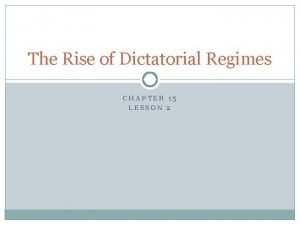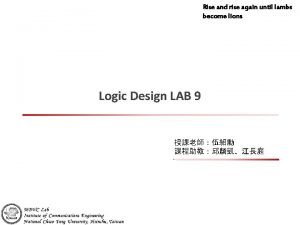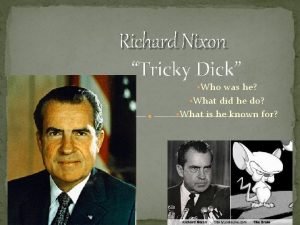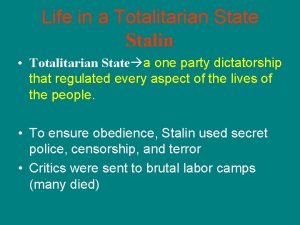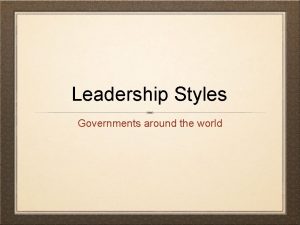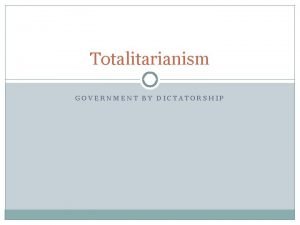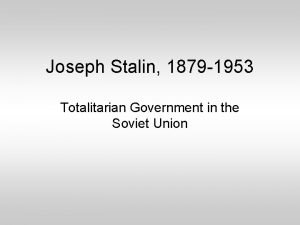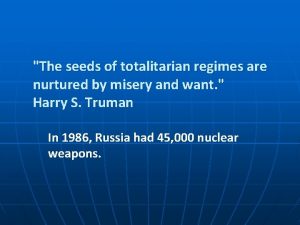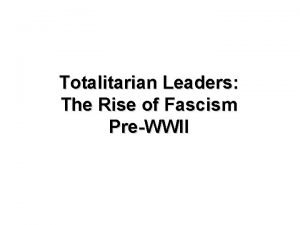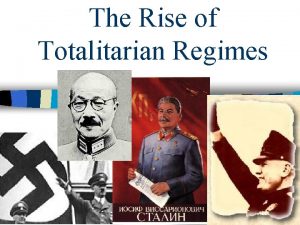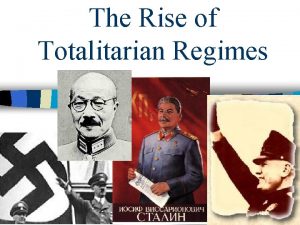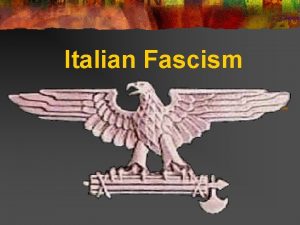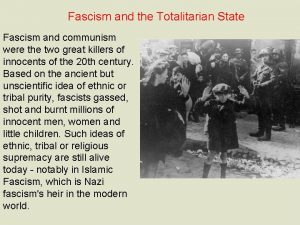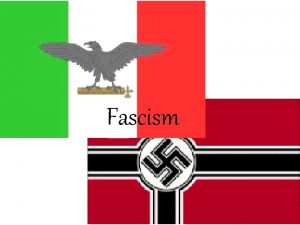Totalitarian Leaders The Rise of Fascism PreWWII Essential









- Slides: 9

Totalitarian Leaders: The Rise of Fascism Pre-WWII

Essential Understandings • Economic disruptions following World War I led to unstable political conditions • Worldwide depression in the 1930 s provided opportunities for the rise of dictators in the Soviet Union, Italy, Germany, and Japan • The Treaty of Versailles worsened economic and political conditions in Europe and led to the rise of totalitarian regimes in Italy and Germany • Japan emerged as a world power after World War I and conducted aggressive imperialistic policies in Asia

Vocabulary • Fascism: ideology or attitude that favors dictatorial government, centralized control of private enterprise, repression of all opposition, and extreme nationalism. • Marxist-Leninist Communism: version of a classless society in which capitalism is overthrown by a working-class revolution that gives ownership and control of wealth and property to the state • Communism (beginning with Stalin): any system of government in which a single, usually totalitarian, party holds power, and the state controls the economy

TOTALITARIANISM Totalitarianism vs. Older concepts of dictatorship -Seek to dominate all aspects of national life -Seek limited, typically political control -Mobilize and make use of mass political participation -Seek pacified and submissive populations -Seek the complete reconstruction of the individual and society -Attempt to rule over the individual and society

Joseph Stalin 1924 Country: Soviet Union Type of Government: Communism (dictatorship) Goals and Ideas: • Crushed opponents and took control after Lenin’s death • Held absolute authority; suppressed resistance • Brought his country to world power status but imposed upon it one of the most ruthless regimes in history • New Economic Policies (NEP) • Collectivization: exported seized goods and gained enough capital to finance a massive industrialization drive • Rapid industrialization: three 5 -year plans • The Great Purges: KGB = secret police killed thousands of army officers and prominent Bolsheviks who opposed Stalin • Feared the growing power of Nazi Germany

Benito Mussolini 1922 Country: Italy Type of Government: Fascism (dictatorship) Goals and Ideas: • Centralized all power in himself as leader (total control of social, economic, and political life) • Ambition to restore the glory of Rome • Invasion of Ethiopia • Alliance with Hitler’s Germany Il Duce

Adolf Hitler 1933 Country: Germany Type of Government: Nazism (dictatorship) Goals and Ideas: • Inflation and depression weakened the democratic government in Germany and allowed an opportunity for Hitler to rise to power • Believed the western powers had no intention of using force to maintain the Treaty of Versailles • Anti-Semitism: persecution of Jews • Extreme nationalism: National Socialism (aka Nazism) • Aggression: German occupation of nearby countries • Lebensraum: unite all German speaking nations • Anschluss: German union with Austria

Hideki Tojo Country: Japan Type of Government: Militarism Goals and Ideas: • Though Japan had an emperor, the military had taken control of the government • Emperor Hirohito could not stand up to the powerful generals, but he was worshipped by the people, who often fought in his name • Industrialization of Japan, lending to a drive for raw materials – how do you get raw materials? IMPERIALISM Hideki Tojo, Military Leader of Japan Hirohito, Emperor of Japan • Invasion of Korea, Manchuria, and the rest of China (the League of Nations did nothing)

 Fascism glorifies the state above the individual
Fascism glorifies the state above the individual Rise and rise again until lambs become lions origin
Rise and rise again until lambs become lions origin Rise and rise again until lambs become lions
Rise and rise again until lambs become lions Tricky dicky richard nixon
Tricky dicky richard nixon Raise and rise again until lambs become lions
Raise and rise again until lambs become lions Stalins totalitarian state
Stalins totalitarian state Totalitarian management style
Totalitarian management style Democracy vs dictatorship
Democracy vs dictatorship Stalin's totalitarian state industrial policies
Stalin's totalitarian state industrial policies The seeds of totalitarian regimes are nurtured
The seeds of totalitarian regimes are nurtured
